Kenya
As burgeoning populations encroach on wildlife habitats, the conflicts between humans and animals increase.
While the world is interested in preserving endangered species they don't share the burden of paying for it according to a study published by the University of Queensland and Griffith University in Australia.
The research assessed 133 countries where 18 different carnivores ranged and found farmers in developing countries like Kenya were more likely to suffer financially compared to countries like the US, Sweden or Norway.
Here in Kajiado, about a hundred kilometres from the capital Nairobi farm workers like Elizabeth Naosha have little faith in the compensation system.
" Lions are very problematic as they kill our cattle at night. The Kenya Wildlife Service usually records our ordeals but it takes so many years for us to be compensated. We thus see no need in reporting the attacks and so we just let the lions eat our livestock," she says.
Families like Naosha's don't just lose an animal when there's a predator.
She says: "We incur huge losses when the lions kill our livestock. We don't have any other source of income apart from keeping livestock. Livestock is our main source of food. We can also sell some to enable us to educate our children. Therefore when the lions eat our livestock, we run into huge losses and we lose our sole source of income."
The author of the study published in Communications Biology was led by Conservation Biologist Alexander Braczkowski
He explains how researchers compared the impact of economic loss between farmers in different parts of the world.
Because farmers in developing countries are already under a financial squeeze, any loss they suffer has a more dramatic impact.
"So what we did is we made an assumption that if a community in Kenya or a community in Sweden or a community in Norway lost a single cattle calf that weighs 250 kilogrammes, how would that impact the per capita income. And we found that countries on average living in the developing economies mainly in the Global South that live alongside carnivores, species like cheetahs, lions, tigers, they suffer about 8 times higher economic vulnerability when you compare them to developed economies say in the United States, Sweden, Norway," says Braczkowski.
However, he says not much thought has been put into studying the impact that these animals have on people who live close to them and their livelihoods.
According to Braczkowski the cost of conservation is immense and even raising funds for this falls short.
Her says tens of millions of dollars are spent on the lion populations of Africa each year, but that's far short of the one billion dollars each year that is actually needed.
Setting up a fund to meet the needs of conservation in developing areas and to take care of the communities there will take international support, finance and planning says Braczkowski.
He says: "So some of the pitfalls brought about by financial compensation, one of the biggest problems is often fund sustainability. So who is funding this compensation schemes. Is it private donors, NGOs? How is it that funding going to last for and also what are some of the compensation scheme rules that are associated with that funding? So basically do you have to provide evidence of the cow or the sheep or the goat that has been lost? Does it have to be in a specific location?"
"We need to call on global leaders and western economies and corporate bodies ramp up rapidly the funding that is required not only save the charismatic carnivores on the ground but also the communities that live alongside them and the livelihoods that are mostly impacted by them."
Kenyan conservationist David Mascall says the current system doesn't work because no governments have been able to pay the cost of compensation.
" The government, the new government, the government before, the Kenya Wildlife Service don't have the massive availability of funds that they have in the western world. So those that do try and get compensation, if they get it at all sometimes they wait till like 5, 6 years you know. Today, you get your group of 20 sheep killed by hyenas, are you going to wait 5, 6 years to get compensation?"
He says as long as local people are being forced to choose between the survival of their families, or the animals , killing the predators will always be the easiest option.
" The only way that you can actually stop the thing from happening is either we put in a deterrent system or kill the perpetrator. The later is the simplest way in a lot of cases. There are laws that regulate that, but who is going to know, whether you put down some poison, you bury the carcass of the lion or whatever it is
that is the perpetrator, no one is any the wiser."




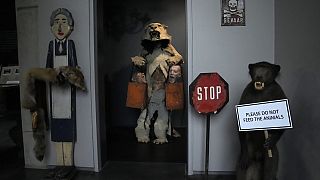
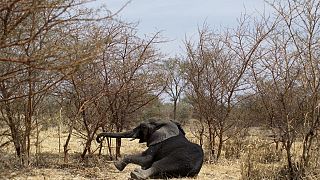

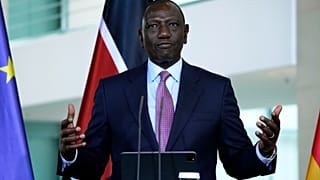


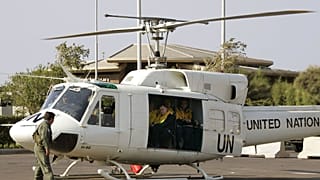
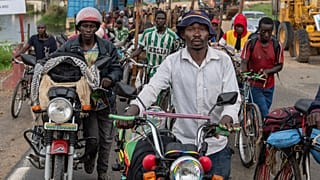
00:03
Court suspends Kenya-U.S. $2.5 billion health cooperation deal
Go to video
Elephant conservation pioneer Iain Douglas-Hamilton dies at 83
00:46
Kenya dominates at Valencia Marathon as Korir and Jepkosgei set personal bests
01:43
US-Kenya $2.5B health deal targets HIV, Malaria and Polio
02:07
In Kenya, women motorcycle riders break stereotypes on the road
00:50
Saffron harvesting flourishes in Morocco's rural Ikniouen commune